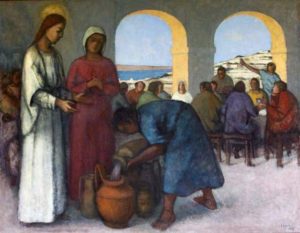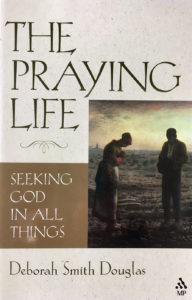New Wine
Praying with Scriptures
At the heart of Ignatian spirituality is the experience of “praying the Scriptures”—a way of prayer that unites thinking and feeling, remembering and imagining. For me, one of the most amazing graces of this form of prayer is the way even the most familiar biblical texts often take on a whole new life, revealing depths of meaning and presence that even the most scholarly “Bible study” can be powerless by itself to uncover.
Rather than elaborate the method, I have chosen to share the experience. I hope this set of meditations on the story of the wedding at Cana—prayerfully imagined in the voices of four people present and transformed by Jesus’ presence there—will amount to an invitation to pray with and in the Scriptures with a new freedom. God grant, in all our engagement with Scripture, that having the eyes of our hearts enlightened, we may know the hope to which Christ has called us (Ephesians 1:18).
John 2:1–11 (NRSV)
 On the third day there was a wedding in Cana of Galilee, and the mother of Jesus was there. Jesus and his disciples had also been invited to the wedding. When the wine gave out, the mother of Jesus said to him, “They have no wine.” And Jesus said to her, “Woman, what concern is that to you and to me? My hour has not yet come.” His mother said to the servants, “Do whatever he tells you.” Now standing there were six stone water jars for the Jewish rites of purification, each holding twenty or thirty gallons. Jesus said to them, “Fill the jars with water.” And they filled them up to the brim. He said to them, “Now draw some out, and take it to the chief steward.” So they took it. When the steward tasted the water that had become wine, and did not know where it came from (though the servants who had drawn the water knew), the steward called the bridegroom and said to him, “Everyone serves the good wine first, and then the inferior wine after the guests have become drunk. But you have kept the good wine until now.” Jesus did this, the first of his signs, in Cana of Galilee, and revealed his glory; and his disciples believed in him.
On the third day there was a wedding in Cana of Galilee, and the mother of Jesus was there. Jesus and his disciples had also been invited to the wedding. When the wine gave out, the mother of Jesus said to him, “They have no wine.” And Jesus said to her, “Woman, what concern is that to you and to me? My hour has not yet come.” His mother said to the servants, “Do whatever he tells you.” Now standing there were six stone water jars for the Jewish rites of purification, each holding twenty or thirty gallons. Jesus said to them, “Fill the jars with water.” And they filled them up to the brim. He said to them, “Now draw some out, and take it to the chief steward.” So they took it. When the steward tasted the water that had become wine, and did not know where it came from (though the servants who had drawn the water knew), the steward called the bridegroom and said to him, “Everyone serves the good wine first, and then the inferior wine after the guests have become drunk. But you have kept the good wine until now.” Jesus did this, the first of his signs, in Cana of Galilee, and revealed his glory; and his disciples believed in him.
The Maidservant Remembers
It was all so quiet. Nobody knew, then, what had happened, except for his mother and us servants. I am not even sure myself just what happened, even now. Much less how. He never touched the water. He never touched the jars, or the cup I filled at his command. He didn’t even say anything special. There was that brief exchange between the two of them, mother and son, and then a sort of stillness in the midst of the noise of the party. (Thank goodness nobody realized we had run out of wine.)
All I know is, I did what he told me.
Miriam and I carried water from the well to fill the big stone jars, empty now after the ritual cleansing before the meal. We filled them up to the top. I remember how the water swelled and trembled at the brim but did not spill.
It was perfectly ordinary water, I swear; I carried it myself, and poured it in. I didn’t even know what he meant to do; I just did what he told me.
And when he told me to, I drew it out again, a cupful to take to the steward of the feast. Only then, it wasn’t water anymore. It was wine. The water was now wine. I nearly dropped the cup when I saw it. I didn’t say anything, but Miriam and I stared at each other and then turned to stare at him.
His eyes met ours steadily, and there was laughter in them, and a kind of exhilaration, and a kind of resignation, too. Almost as though more than the water had been changed. As though something even bigger than that had happened. As though something was beginning, really—for him, and for us all.
I know it sounds strange, but I couldn’t help feeling, holding that cup of new wine that had never been grapes, that somehow everything had changed, forever. Something had started that could not be stopped, and nothing would ever be the same.
All is know is, I did what he told me. And you know what? I think the water did, too.
The Bride Remembers
I was miserable when the wine gave out. Not so much embarrassed, even though it was my own wedding and I suppose any bride would be humiliated to begin her married life that way. But it was worse than that. It seemed an omen, and a bleak one, for my whole life.
I knew that Jacob was not happy about the marriage our fathers had arranged. I have always known he would have preferred my younger sister—she is prettier and livelier than I. Even at the wedding feast he couldn’t help watching her as she laughed and danced with the other young girls. But I hadn’t known he was so displeased as this—so reluctant as to fail to provide enough wine for our guests to drink our health and happiness.
What kind of life could I expect with such a man? I sat in silence, staring into my empty cup, trying not to think of years stretching our as empty, as joyless, as that.
But then I heard a burst of laughter from the steward and saw him bearing a jug though the crowd to my husband’s place at the table. He splashed some wine into a cup and raised it exuberantly, saying something about saving the good wine until now. I think Jacob was as startled as I was—we had both known, separated by the length of the table though we were, that there was no wine left. Wearily I thought, at least we share the knowledge of what we lack.
But here was wine. Out of nowhere, out of nothing.
Jacob sent a pitcher full down to my end of the table, and he met my eyes as he raised his cup to me in a silent salutation. Gratitude and astonishment and relief flashed between us and drew us for a moment close together.
Who knows where it came from? I drank deep, and gladly. Some unexpected gift, I supposed, and thanked God for it, and for the unknown guest who had provided it.
There were many things I did not know or understand, I reflected as I felt the wine warm my cold flesh, and hope spread like fire in my veins. Perhaps the future was not as empty as I had thought. Perhaps this marriage held not so meager a prospect. If this could happen, anything could.
Perhaps my full cup was an omen more powerful than the empty one had had been. God grant it so. God grant us a long life together, and many surprises to encounter, together, along the way.
I raised my cup to my new husband and—for the first time—smiled at him from my heart.
A Guest Remembers
It certainly wasn’t much of a wedding. Just an ordinary provincial do. I would so much rather not have gone at all. Our youngest son was ill of a fever at home in Capernaum; I didn’t know anyone in Cana—and Jewish celebrations are so…tribal. I always feel awkward and out of place. Unwelcome, really, although I suppose people are always polite enough.
But Julius takes his official responsibilities seriously and was pleased that we had been invited. Tensions with Rome have been getting worse lately in Galilee, and he felt it was important that we both attend. So there I was. Smiling fixedly at strangers, wishing I were at home, wishing I had worn a different gown, wishing I had another glass of wine.
I heard a whisper pass through the crowd like a breeze, a rumor that there was no more wine. Catastrophe. Even in the provinces. But it can’t have been true, because in fact suddenly there were rivers of wine, oceans of wine, there at that village wedding. I have never seen such abundance, even in Rome. And it wasn’t that awful raw Galilean stuff we’ve gotten used to. In fact, it was marvelous. The best wine I have ever tasted anywhere.
I must have raised my eyebrows in astonishment over the rim of my cup, because suddenly Julius was grinning at me wryly. I remembered my manners, and my duty, and turned with well-practiced graciousness to speak to the inconspicuous woman seated next to me. Some relative of the bride, I think she was, an aunt or something. But I forgot my dignity and Julius’ position—I forgot even my aching head and anxious heart, because I was so struck by the woman’s face.
The face of a woman no longer young, it was both serene and deeply marked by sorrow. Very much a mother’s face. But what arrested my commonplace remark was the clear impression of something enormous happening to her at that very moment.
She looked as though she had just been given a princely gift, or had just had something priceless taken away. Or as if she had just heard some long-awaited news—or as though she were listening for something, the way all mothers do. Almost as though—absurd thought—she were the mother of all living.
An odd impression. I tried to shake it off, attributing the unaccustomed fancy to the really extraordinary wine. I ended up not speaking to her at all—oddly enough, it would have felt presumptuous—but the wordless smile she gave me lit up the whole room.
The evening ended better than it had begun. That evening, in fact, felt like the beginning of something important. I have never forgotten that woman’s face or the excellence of that wine. For some reason I date our real life in Galilee (as opposed to our exile there) from that night. It was the first time we felt welcome in a Jewish home, invited to a party that seemed suddenly, for a moment, to include the whole world.
Nathanael Remembers
I never thought it would begin like that. Of course, I had scarcely had time to think at all. It had only been the day before that the whole thing started, when Philip hauled me over to meet him. It was his knowing about that business under the fig tree that made me realize who he must be. Knowing who he was, I would have followed him anywhere, even to the ends of the earth. I knew the others felt the same. We were ready for anything.
But the very first thing we did, the very next day, was follow him to a hometown wedding. It didn’t seem awfully auspicious, really—not even much of a party. I’ve known those two kids all my life of course, and naturally I wish them well, but it wasn’t exactly festive, as wedding feasts go. They even ran out of wine.
And that is when it happened. I don’t think anybody else saw it, except for his mother—it was her idea—and a couple of the servants, but Peter and I were leaning against the wall next to the water jars, nursing the last of the sour local wine that was all poor Jacob had been able to come up with.
We saw it, all right. We saw the servants fill the jars with water; we saw them take out wine. But if we hadn’t seen it, we never would have known where it came from.
I felt Peter stiffen beside me. They were drawing the wine out by the pitcher-full now, and someone splashed a bit on his tunic, where a stain spread dark as blood. “So much, Lord?” I heard him whisper, and for a second—I was pretty flabbergasted, you understand, and not quite thinking straight—I thought he was talking about blood, not wine. But here was much wine indeed—all six jars, each up to my shoulder, filled to the brim with the best wine Cana has ever tasted, before or since. It was far more than enough—Judas always shook his head disapprovingly when he heard the story afterward—and far better than it needed to be.
A strange way for the whole thing to begin. Water and wine and small town weddings and low-key miracles were not our idea, in those days, of the way to establish a Kingdom.
But it was the beginning, and it was enough.
Just for a second there, just as he had promised—right there among the wedding guests and the wine cups and the water jars—I had a glimpse of heaven opened, a glimpse of angels going up and down.
And so it began.

